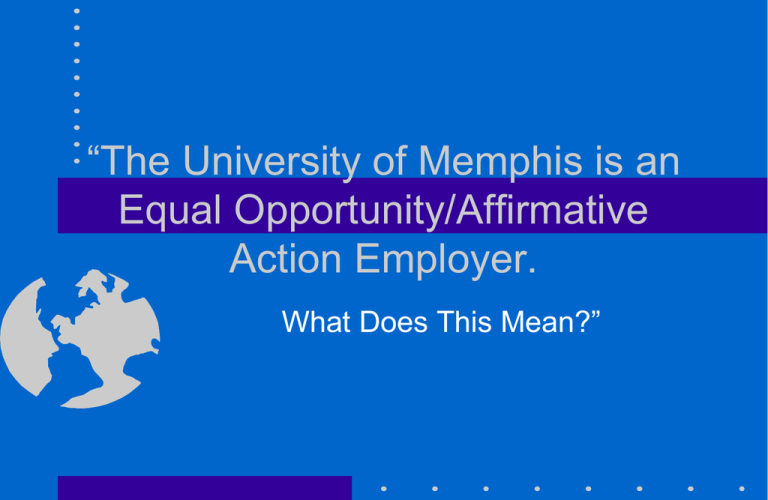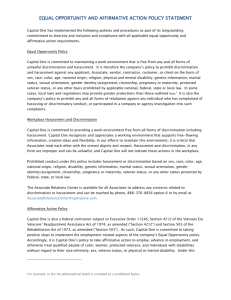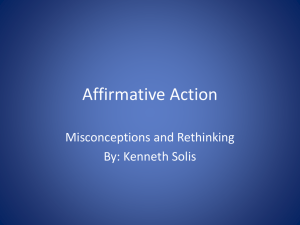
“The University of Memphis is an
Equal Opportunity/Affirmative
Action Employer.
What Does This Mean?”
Introduction
• As a University of Memphis faculty or staff member
you’ve probably noticed the statement “The
University is an Equal Opportunity/Affirmative Action
Employer.” This statement appears on all
publications, letterhead, and advertisements. On
more formal printed University correspondence and
publications, the University uses an expanded
version of the previous statement.
• “The University of Memphis, a Tennessee Board of
Regents Institution, is an Equal Opportunity/
Affirmative Action Employer. We urge all qualified
applicants to apply for this position. Appointment will
be based on qualifications as they relate to position
requirements without regard to race, color, national
origin, religion, sex, age, disability, or veteran status.”
• If you’ve been in the workforce for a while, this has
become routine for most employers. This
presentation will explain why we use this statement
and the purposes for the federal regulations. Policy
and procedures information should be discussed with
employees every year.
Federal EEO Laws
• Federal law requires
The University of
Memphis to make
employment decisions
without regard to race,
color, sex, age, national
origin, religion and
disability.
Federal EEO laws which prohibit discrimination against
these classes:
• Title VII of the Civil Rights Act of 1964: race, color,
sex, religion and national origin
• The Civil Rights Act of 1991
• The Age Discrimination in Employment Act (ADE A)
• Title VI of the Civil Rights Act of 1964: race, color,
and national origin
• The Americans with Disabilities Act of 1990 (ADA)
• The Rehabilitation Act of 1973
•
•
•
•
•
•
•
•
The Equal Pay Act
The Pregnancy Discrimination Act (PDA)
Executive Order 11246
State and municipal laws
Vietnam Era Veterans Readjustment Assistance Act
Sexual Harassment
Title IX of the Educational Amendments Act of 1972
Immigration Reform and Control Act of 1986
How Do We Ever Keep Up With All of These Laws?
•
•
•
•
•
•
•
•
•
OSHA
Office of Civil Rights
Department of Labor
Department of Labor
Department of Education
NAACP
INS
Department of Personnel Management
Department of Justice
• While there are several federal agencies who
monitor compliance of these regulations, the three
most important agencies are the Office of Federal
Contract Compliance Programs or OFCCP, The
Equal Employment Opportunity Commission or
EEOC, and The Tennessee Human Rights
Commission or THRC.
So What’s the Difference Between Affirmative Action
and Equal Employment Opportunity?
• Affirmative Action is one means to end discrimination
and to remedy the effects of past discrimination in
the workplace. It includes productive recruitment
and positive outreach activities and plans designed
to notify and attract women, minorities, persons with
disabilities, disabled veterans, Vietnam era veterans
or other underrepresented groups about job
openings and opportunities.
• The University of Memphis does this to ensure fair
and equitable employment practices as well as to
achieve an equitable representation in our workforce.
• Under Executive Order 11246, Affirmative Action
requires The U of M to establish an Affirmative Action
Plan to accomplish these measures and to assess
the status of our workforce.
• Affirmative Action strategies are intended to help
bring these groups to our front door, or to be more
precise, into our applicant pools.
• Once good faith efforts to attract these individuals
have been made, Equal Employment Opportunity
takes over.
Equal Employment Opportunity
• Equal Employment Opportunity (EEO) provides a
working environment for all employees free of
discrimination, prejudice, and bias.
• Any employment decision made should be based on
sound management principles and should not be tied
to any discriminatory factors discussed earlier.
So What Do All These Rules and Regulations Mean?
• Sex Discrimination:
– Gender
– The Pregnancy Act (PDA)
– Sexual Harassment
Gender
• It is a violation of University policy, as well as federal
and state laws, to discriminate against employees or
applicants for employment on the basis of sex.
• Most recently, the EEOC and the OFCCP started
examining promotional opportunities for women in
the upper echelons of companies. This is known as
a “Glass Ceiling Audit.”
The Pregnancy Act
• Sex discrimination can
take a number of forms:
• The Pregnancy Act or
PDA is designed to
prevent discrimination in
the workplace against
women as a result of
their role as child
bearers.
• It is the policy of The University of Memphis to
provide eligible women employees with leave and
adequate recovery time for childbearing.
• The woman employee is normally reinstated to her
original job.
Sexual Harassment
• It is a violation of University policy to harass any
member of the University community on the basis of
sex.
• Sexual harassment may be defined as unwelcome
sexual advances, requests for sexual favors or other
verbal or physical conduct of a sexual nature when
submission to such conduct is made a term or
condition of an individual’s employment, or
submission to or rejection of such conduct is used as
a basis for employment decisions or whenever such
• conduct has the purpose or effect of interfering with
the work performance through the creation of a
hostile environment.
• A hostile environment may be created by repeated,
unwelcome sexual contact or remarks, including
jokes or demeaning statements about a particular
gender made in the workplace.
• Application of this doctrine in the classroom is far
more complicated for faculty because it implicates
academic freedom.
• If questioned a faculty will have to be able to show
that such remarks or jokes are legitimately within the
scope of the course that he or she is teaching when
the remarks are made.
• Consensual relationships:
– Intimate relationships between supervisors and their
subordinates, between faculty members and students are
strongly discouraged due to the inherent inequality of
power in such situations. These relationships could lead to
undue favoritism or the perception of undue favoritism,
abuse of power, compromised judgement or impaired
objectivity.
• Obviously any employment decision made on the
basis of gender is a violation of state and federal
laws and regulations, as well as University policy,
unless the position qualifies for the bona fide
occupational exception under Title VII.
Race, Color or National Origin Discrimination
• Race, color or national origin
• Racial Harassment
• It is a violation of University policy to harass a person
because of the individual’s race, color, or national
origin.
• Racial harassment may be defined as:
– “conduct by the employer, or its employees which
unreasonably interferes with the victim’s status or
performance through the creation of an intimidating,
hostile, or offensive working or educational environment.”
• Like sexual harassment, a hostile environment based
on race may be created through repeated remarks,
jokes, or slurs regarding race or national origin made
in the workplace or educational environment.
Disabled and Veterans of the Vietnam Era
• It is University policy to take Affirmative Action to
employ and advance in employment qualified
disabled veterans, and Vietnam era veterans
whether they are disabled or not.
• Recently, the law added in coverage for veterans
who served on active duty during a war or in a
campaign or expedition for which a campaign badge
has been authorized.
• Generally this regulation requires the University to
post job openings with the local state employment
agency.
• Usually those positions which are considered
executive and top management jobs, jobs which are
posted internally, and jobs lasting 3 days or less do
not have to be posted with the local State
Employment Agency.
• The law requires that employers with Federal
contracts or subcontracts of $25,000 or more provide
equal opportunity and affirmative action for Vietnam
era veterans, special disabled veterans and veterans
who served on active duty during a war or in a
campaign or expedition for which a campaign badge
has been authorized.
Religious Discrimination
• The University of Memphis prohibits discrimination
based on religion against applicants for employment
and employees.
• Efforts will be made to accommodate the religious
observances and practices of employees unless the
requested accommodation is unreasonable and
would result in an undue hardship on the conduct of
University business.
National Origin Discrimination
• It is the policy of the University to prohibit the
discrimination based on an individual’s place of
origin, or his or her ancestor’s place of origin, or
because an individual has physical, cultural, or
linguistic characteristics of a national origin.
• Additionally, it is against University policy to
discriminate because of a marriage to or association
with persons of a national origin group, or due to
membership in or association with an organization
identified with the interests of a national group.
Age Discrimination in Employment Act (ADEA)
• ADEA prohibits discrimination on the basis of age as
to applicants for employment and employees the age
of 40 or over except when age is a bona fide
occupational qualification or the employer is
observing the terms of either a bona fide seniority
system or employee benefit plan.
Persons with Disabilities
• Rehabilitation Act
• The Americans with Disabilities Act
• The Rehabilitation Act
promotes employment of
persons with disabilities and
was designed to prevent
discrimination.
• A person with a disability is:
– “anyone who has a physical or mental
impairment which substantially limits
one or more of the major life activities,
has a record of such an impairment, or
is regarded as having such an
impairment.”
Americans with Disabilities Act (ADA)
• The Americans with Disabilities Act of 1990 basically
strengthened and extended the requirements of The
Rehabilitation Act making them applicable to private
as well as public employers and added stronger laws
related to public accommodations,
telecommunications, and transportation.
• Companies that serve the general public are required
to make their facilities, services, goods and other
public accommodation accessible.
The Equal Pay Act (EPA)
• The Equal Pay Act (EPA) requires that men and
women receive equal pay for equal work.
• It’s not a violation if salaries are not equal due to a
seniority system, merit system, a system which
measures earnings by quantity or quality of
production or because of any factor other than sex.
Conclusion
• As you can see, complying with Equal Employment
Opportunity/Affirmative Action legislation and
applicable regulations is not easy and as employees
or supervisors, you may be required to explain your
actions, decisions, or recommendations.
• The University must ensure that all employmentrelated decisions and actions are based on sound
management principles and professional standards.
• They must not and will not be based on “race, color,
sex, age, national origin, religion, disability, or
Vietnam era or disabled veterans status.”
• To comply with policies, procedures, or sound
business practices, you may have to complete more
paperwork or have more meetings with your
supervisor or co-workers.
• These extra efforts on your part will help to ensure
that The University of Memphis is a working
environment free of discrimination.








